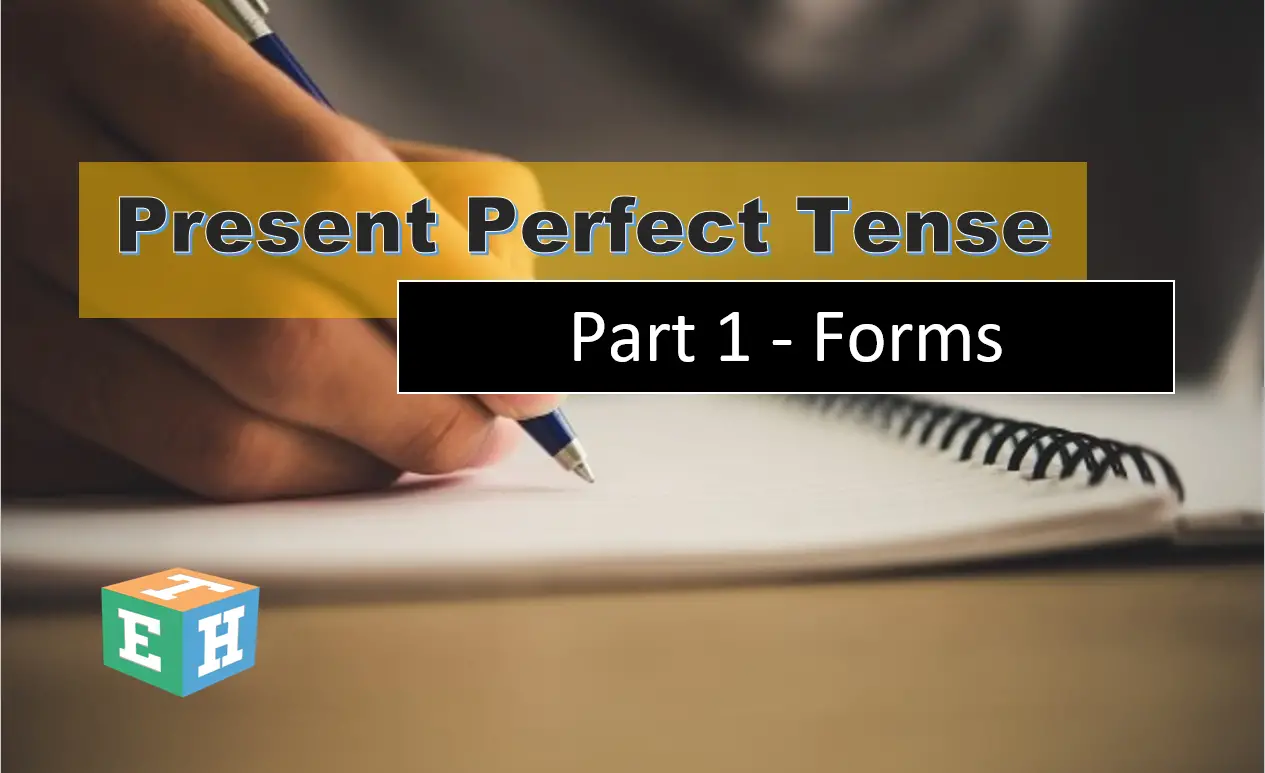Present Perfect Tense Form | Part I
Present Perfect Tense Form – are used to used to indicate acts that took place at an arbitrary time. The present perfect tense can also be used to represent acts that began in the past but are still ongoing. Through this lesson you will be familiar with the forms and example in sentence that explains what is a present perfect tense.
In this lesson, you will learn the affirmative form (positive), negative form, and the question form of the present perfect tense. I will also explain the contracted forms of the negative and the affirmative.
This tense is used to describe both incomplete and completed acts. 1: We use this tense to refer about unfinished activities, states, or habits that began in the past and are still going on now. We usually use it to say ‘how long’ and we need’since’ or’for’ to complete the sentence. Stative verbs are frequently used.
Any verb’s present perfect is made up of two parts: the appropriate form of the auxiliary verb to have (present tense) and the main verb’s past participle.
The present in English is divided into two types: simple present and progressive present.
Watch the video here:
So, let’s start with the form:
Present Perfect Tense Affirmative Form
The present perfect tense is formed by a combination of the auxiliary verb “have” followed by the past participle of the main verb. Now I provide you the example sentence of the present perfect tense in auxiliary form.
I have finished my homework. The highlighted words is the present perfect affirmative.
(auxiliary verb) (main verb)
verb “have” verb
Subject + (present simple form) + (past participle form)
Present Perfect Tense Affirmative Form Example:
| Subject | Present Simple Form | Past Participle Form |
| I | have | finished |
| You | have | finished |
| He / she / it | has | finished |
| We | have | finished |
| They | have | finished |
Contracted form (Affirmative)
A linguistic term is contracted form. It refers to short words that are formed by combining two words and removing some letters, which are replaced with an apostrophe. Here’s the Present Perfect Tense in Contracted Affirmative Form Example Sentence:
| I have finished | I’ve finished |
| You have finished | You’ve finished |
| He has finished | He’s finished |
| She has finished | She’s finished |
| It has finished | It’s finished |
| We have finished | We’ve finished |
| They have finished | They’ve finished |
Present Perfect Tense Negative Form
Declarative statements are negative sentences. That is, they pass on information that they consider to be accurate. The word “not” is usually added after the assisting verb to make negative phrases. There are the sentence example that are provided below.
“I have not finished my homework.” = Subject + (present simple form) + “not” + (past participle form)
Present Perfect Tense Negative Form Example:
| I | have | not | finished |
| You | have | not | finished |
| He / She / It | has | not | finished |
| We | have | not | finished |
| They | have | not | finished |
Contracted form (Negative)
Present Perfect Tense in Contracted Negative Form Example:
I have not finished ” I haven’t finished ” I’ve not finished
You have not finished ” You haven’t finished ” You’ve not finished
He has not finished ” He haven’t finished ” He’s not finished
She has not finished ” She hasn’t finished ” She’s not finished
It has not finished ” It hasn’t finished ” It’s not finished
We have not finished ” We haven’t finished ” We’ve not finished
You have not finished ” You haven’t finished ” You’ve not finished
They have not finished ” They haven’t finished ” They’ve not finished
Present Perfect Tense Negative Form
A question is a sort of sentence expressed in such a way that it requires—or at least appears to require—an answer in grammar. A question is usually distinguished by the inversion of the subject and the first verb in the verb phrase, as well as the use of an interrogative pronoun or the use of a tag question. Present Perfect Tense Question Form Example Sentence:
(present simple form) + Subject + (past participle form) + ?
Have I finished?
Have you finished?
Has he / she / it finished?
Have we finished?
Have they finished?
for ‘wh’ questions, we just put the question word before ‘have‘ or ‘has‘:
- Where have I left my glasses?
- What have we done today?
- Why has it rained so much this summer?
- How long have you known Jack?
Past participle form – spelling rules
The past tense is a grammatical tense that refers to an action or event that occurred in the past. The English verbs sang, went, and washed are examples of past tense verbs. Most languages include a past tense, and some have multiple forms to express how long ago an action occurred.
For regular verbs, simply add –ed:
talk ” talked shout ” shouted
wash ” washed cook ” cooked
Regular verbs ending in silent e, add d
die ” died
close ” closed
Regular verbs ending in a consonant and –y; change the –y to –i and add ed.
hurry ” hurried
carry ” carried
Regular verbs ending in a vowel and –y, add –ed
stay ” stayed
play ” played
Regular verb with one syllable ends in consonant + vowel + consonant;
Double the consonant and add –ed.
beg ” begged stir ” stirred
clap ” clapped wrap ” wrapped
Regular verb with more than 1 syllable and ends in consonant + vowel + consonant; Double the final consonant only if the final syllable is stressed and add –ed.
excel ” excelled commit ” committed
submit ” submitted deter ” deterred
If the final syllable is NOT stressed add –ed
listen ” listened open ” opened
happen ” happened visit ” visited
Verbs ending in –l, always double the “l” and add –ed.
cancel ” cancelled
travel ” travelled
This is in British English but in American English follow the rules above; (stressed or non-stressed final syllable)
cancel ” canceled
travel ” traveled
Irregular verbs- Past participle form
An irregular verb is one that does not append “-ed” or “-d” to the base form to generate its simple past tense or past participle.
| verb | Past participle |
| be | been |
| beat | beaten |
| begin | begun |
| blow | blown |
| break | broken |
| bring | brought |
| build | built |
| buy | bought |
| catch | caught |
| choose | chosen |
| drink | drunk |
| drive | driven |
Position of adverbs
An example of adverbs that we can use with the present perfect; always, never, only, ever, still, just, already and there are many others. How do we position these words?
Adverbs in Present Perfect Tense Auxiliary Form
We have just arrived at the zoo.
I have only cleaned the garage.
So, the adverb is between the past participle and the auxiliary verb have.
Adverbs in Present Perfect Tense Question Form
Have you ever visited Manila?
Has she already left the school?
So the adverb again is in between the past participle and the question form of the auxiliary verb have or after the subject.
Present Perfect Tense Form Exercises:
Exercise 1: Put the verbs into the correct form (present perfect simple).
1. I (not / work) ________________ today.
2. We (buy) ________________ a new lamp.
3. We (not / plan) ________________ our holiday yet.
4. Where (be / you) ________________?
5. He (write) ________________ five letters.
6. She (not / see) ________________ him for a long time.
7. (be / you) ________________ at school?
8. School (not / start) ________________ yet.
9. (speak / he) ________________ to his boss?
10. No, he (have / not) ________________ the time yet.
Exercise 2: Put the words in brackets into the affirmative present perfect form.
1. They ________________ this month in London. (leave)
2. He ________________ a lot of English papers. (bring)
3. She ________________ me about it. (tell)
4. I ________________ to Radio City. (be)
5. I think the director ________________ the town. (leave)
6. I ________________ my office. (paint)
7. I ________________ him my last penny. (give)
8. He ________________ his name on my book. (write)
9. She ________________ a new job. (find)
10. He ________________ very well. (speak)
Answers: Exercise 1
1. I have not worked today.
2. We have bought a new lamp.
3. We haven’t planned our holiday yet.
4. Where have you been?
5. He has written five letters.
6. She hasn’t seen him for a long time.
7. Have you been at school?
8. School hasn’t started yet.
9. Has he spoken to his boss?
10. No, he has not had the time yet.
Answers: Exercise 2: Put the words in brackets into the affirmative present perfect form.
1. They have left this month in London. (leave)
2. He has brought a lot of English papers. (bring)
3. She has told me about it. (tell)
4. I have been to Radio City. (be)
5. I think the director has left the town. (leave)
6. I have painted my office. (paint)
7. I have given him my last penny. (give)
8. He has written his name on my book. (write)
9. She has found a new job. (find)
10. He has spoken very well. (speak)
Downloadable Material
Here’s the downloadable material of Tutorial on Present Perfect Tense Part 1 here.
For more readings
- Irregular Nouns in the Plural / English grammar rules
- Quiet or quite / Confusing English words
- Expressing PREFERENCES: English Lesson
- Comparing Things with “AS” / English Grammar
- Comparative Adjectives – English Grammar Lesson
If you have any questions or suggestions about Present Perfect Tense Part 1, please feel free to leave a comment below or send us a message using our contact page.


